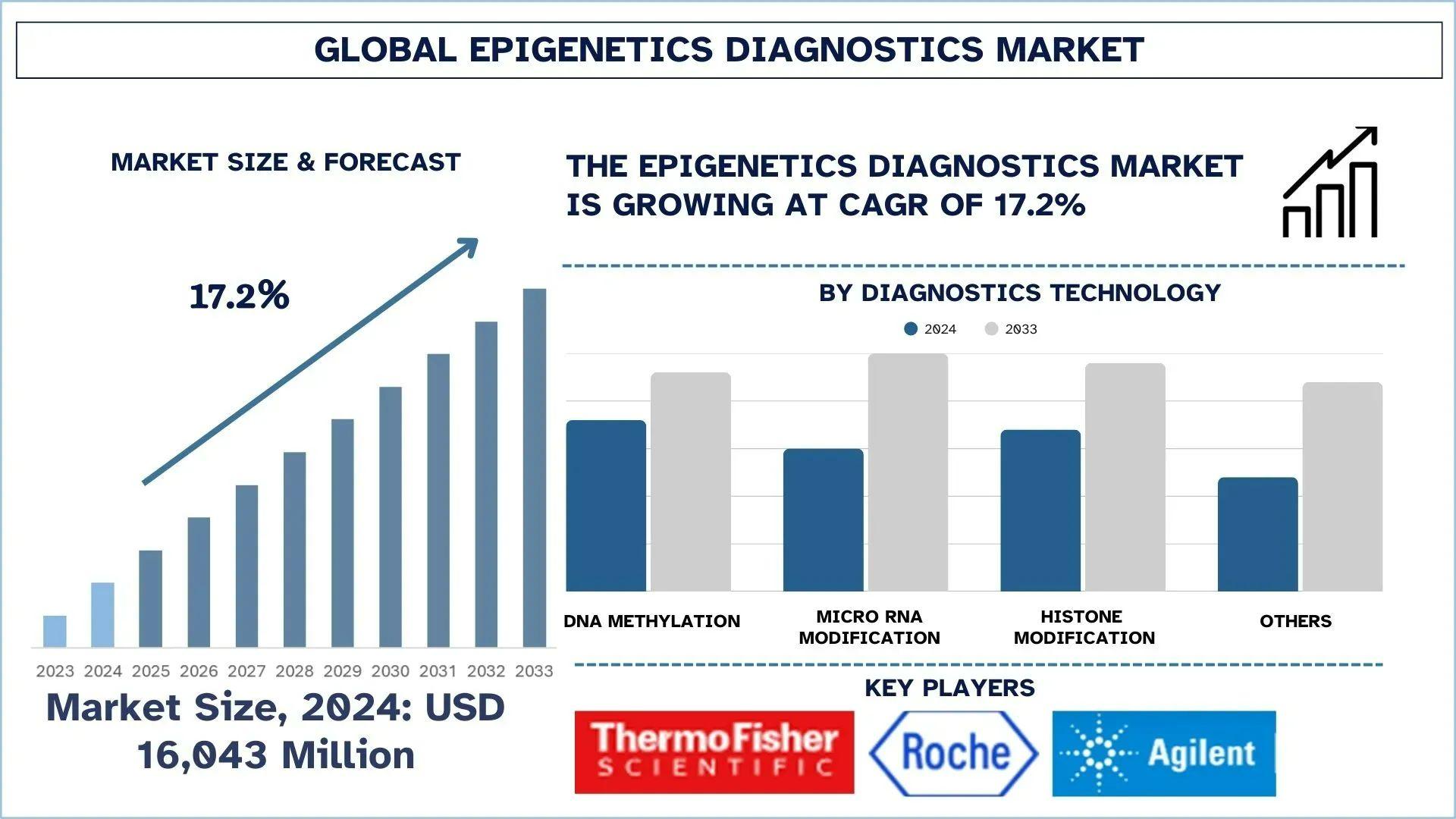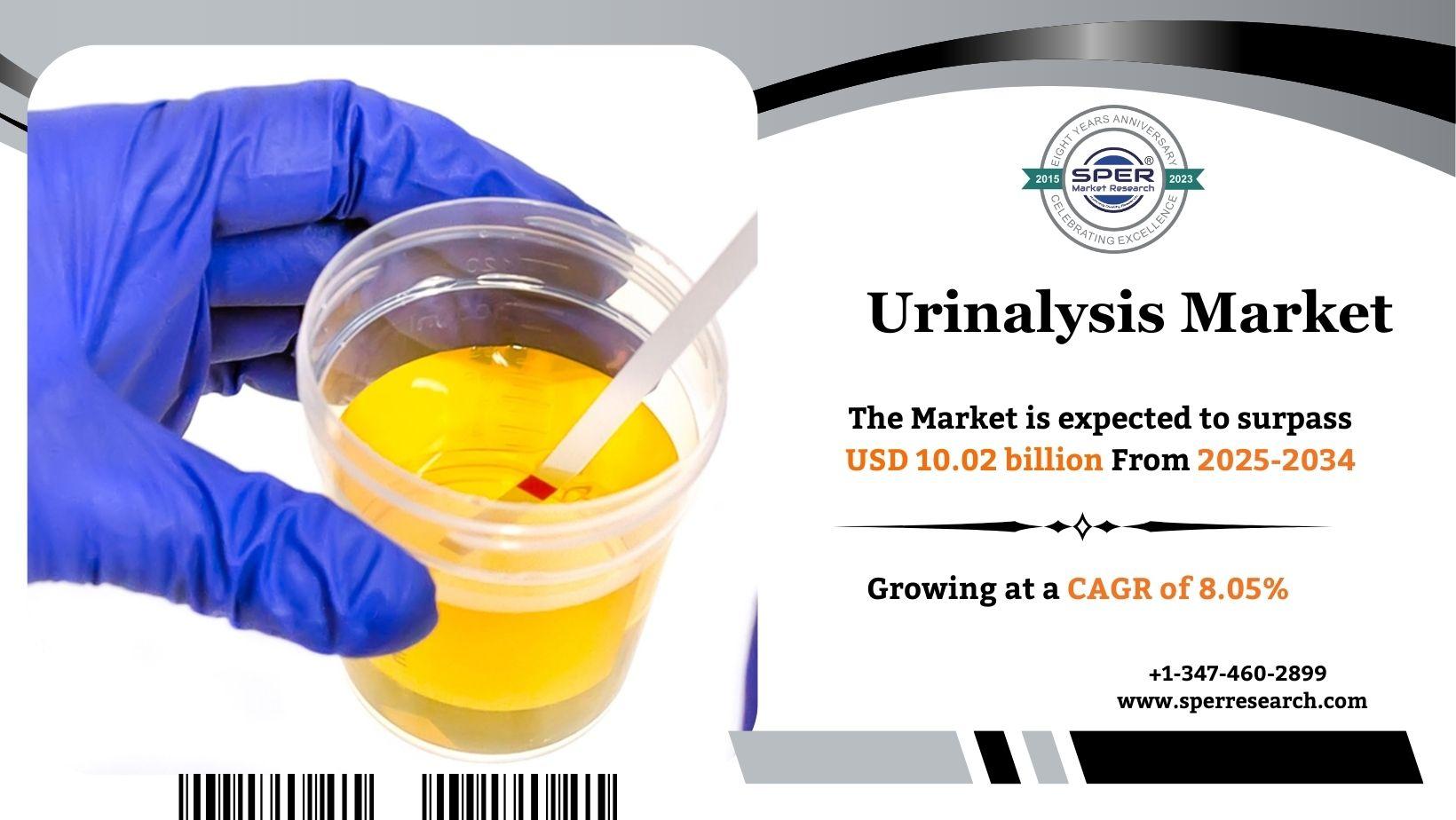Epigenetics Diagnostics Market Analysis by Size, Share, Growth, Trends and Forecast (2025–2033) | UnivDatos

According to the UnivDatos analysis, increasing prevalence of cancer and chronic diseases, and growing awareness of personalized medicine are the major factors driving the growth of the epigenetics diagnostics market worldwide. As per their “Epigenetics Diagnostics Market” report, the global market was valued at USD 16,043 million in 2024, growing at a CAGR of about 17.2% during the forecast period from 2025 - 2033 to reach USD million by 2033.
Epigenetic diagnostics are those molecular techniques used to detect epigenetic changes (DNA methylation, histone modification, and non-coding RNA expression) regulating gene activity without changing the underlying DNA sequence. These changes can affect gene expression and are commonly linked to the progression of cancers as well as neurological, autoimmune, and other diseases. The early disease detection, prognosis assessment, and personalized treatment planning can be achieved by specific epigenetic biomarkers recognized through epigenetic diagnostics. Traditional genetic testing has a very static view of disease mechanisms, compared to this approach that provides a much more dynamic understanding of how both genetic predisposition and environmental influences modulate gene regulation.
Access sample report (including graphs, charts, and figures): https://univdatos.com/reports/epigenetics-diagnostics-market?popup=report-enquiry
1. Shift toward liquid biopsy-based epigenetic testin
This shift to liquid biopsy-based epigenetic testing is revolutionizing diagnostics by providing a highly sensitive, non-invasive means to detect epigenetic alterations in various diseases. While tissue biopsies are simple, liquid biopsies examine blood and other fluids from the body, making the process safer, easier, and more affordable. Even in early-stage disease, these tests are able to identify DNA methylation or other epigenetic markers, so that appropriate intervention as well as real-time monitoring of treatment response can be initiated. However, as the technology matures, liquid biopsies are envisaged to become a key driver of expansion for the market while they become a routine part of diagnostic processes, especially in oncology and prenatal screening.
2. Growing collaborations between pharma and diagnostic companies
The epigenetics diagnostics market requires collaborations between pharmaceutical and diagnostic companies. These partnerships are helping to co-develop companion diagnostics to associate onboarded epigenetic markers with targeted therapies, improving treatment efficacy and patient outcomes. These efficient collaborations speed up clinical trial processes, cut R&D costs, and get products to market faster, through integrated development strategies that help to support regulatory approvals. Moreover, diagnostic companies gain from pharma’s global reach, and pharma gets access to state-of-the-art testing technologies, thus supporting the collaboration activities. The creation of these alliances is powering personalized medicine and catalyzing more exact patient stratification, and also broadening commercial opportunities for both sectors across a variety of therapeutic areas.
Additionally, other industries are also engaging in collaboration with diagnostic companies to get insights regarding genetics. For instance, in March 2025, L’Oréal, which is the leader in the beauty industry, announced a strategic research and development partnership with Tru Diagnostic, the foremost authority in epigenomics testing. This collaboration aims to explore the connection between beauty indicators and changes in epigenomic markers, paving the way for groundbreaking advancements in the field of longevity.
3. Focus on Neuro-epigenetics
The epigenetics diagnostics market is witnessing promising developments in neuro-epigenetics, which is an epigenetics approach to examining how epigenetic mechanisms promote and regulate brain development, cognitive function, and neurological disease. Histone modifications and DNA methylation patterns not only determine gene expression, but they are increasingly found to be connected to disorders such as Alzheimer’s, Parkinson’s, and autism spectrum conditions. The potential of diagnostic tools to identify these alterations, early diagnosis, prognosis, and development of therapeutic targets for these alterations are considered promising for neurodegenerative and psychiatric disorders. As brain-based conditions rise in prevalence and few diagnostic biomarkers of brain function are currently available, research and innovation in neuro-epigenetics are projected to accompany innovative precision neurology and mental health management.
Click here to view the Report Description & TOC https://univdatos.com/reports/epigenetics-diagnostics-market
Future Trends Fueling the Growth of the Epigenetics Diagnostics Market
The epigenetics diagnostics market is set to grow because of ongoing future trends such as the shift toward liquid biopsy-based epigenetic testing, growing collaborations between pharma and diagnostic companies, and a growing focus on neuro-epigenetics. These trends are accelerating the epigenetics diagnostics market globally and promoting the adoption and development of innovative and potential diagnostics technologies.
Related Report
Epigenetics Market: Current Analysis and Forecast (2021-2027)
Molecular Diagnostics Market: Current Analysis and Forecast 2025-2033
Digital Genome Instrument Market: Current Analysis and Forecast (2023-2030)
In-Vitro Diagnostics Market: Current Analysis and Forecast (2025-2033)
Artificial intelligence (AI) in Medical Diagnostics Market: Current Analysis and Forecast (2021-2027)
Contact Us:
UnivDatos
Contact Number - +1 978 733 0253
Email - contact@univdatos.com
Website - www.univdatos.com
Linkedin- https://www.linkedin.com/company/univ-datos-market-insight/mycompany/



